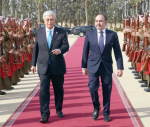You are here
Lebanese-Canadian academic to be tried over 1980 Paris bombing
By AFP - Jan 27,2021 - Last updated at Jan 27,2021
PARIS — A French court on Wednesday ordered a Lebanese-Canadian academic to stand trial over the 1980 bombing of a Paris synagogue, three years after magistrates deemed the evidence against him “not convincing enough”.
Four people were killed and 46 injured in the October 3, 1980, attack on a synagogue on Copernic Street in Paris — the first fatal attack on Jews in France since the Nazi occupation in World War II.
Hassan Diab, 67, is accused of having planted the bomb.
He was extradited from Canada to France in 2014, but released in 2018 after investigating magistrates dismissed the case, saying the evidence was too weak.
On Wednesday, a Paris appeals court overturned that decision and ordered him to stand trial in the latest twist in a decades-long legal saga playing out on both sides of the Atlantic.
Diab’s French legal team called the ruling “crazy”, telling AFP it was motivated purely by a “politically correct” drive to have a trial at all costs.
His Canadian lawyer Donald Bayne called it “the continuation of a long odyssey of injustice... that flies in the face of the evidence”.
The decision, he added in a videoconference in Ottawa, is “devastating” to Diab and his family, who thought they had turned the page.
Victims’ ‘long struggle’
But a lawyer for the synagogue and for the families of two of the victims of the attack hailed the prospect of a trial.
“We’re almost the end of a long struggle,” Bernard Cahen said.
A former professor of sociology at the University of Ottawa, Diab is accused of planting explosives inside the saddle bag of a motorbike that exploded outside the synagogue close to the Champs-Elysees, where hundreds had gathered for Sabbath prayers.
Investigators blamed the attack on the Special Operations branch of the Popular Front for the Liberation of Palestine (PFLP).
Diab has always denied involvement in the bombing, saying he was taking exams in Beirut at the time.
He spent a total of nine years either in jail or under strict bail conditions in Canada and France, awaiting trial.
After his release from custody in France, he returned to Canada and sued the government there for millions of dollars for extraditing him.
Evidence presented against him in France included a sketch of the bomber that resembled him and the discovery of a passport in his name with entry and exit stamps from Spain, where the bomber is believed to have fled.
There were also testimonies from witnesses that Diab was a member of the PFLP.
Dismissing the case in 2018, investigating magistrates said the evidence showed that Diab was “probably in Lebanon at the time” of the attack.
But the state prosecutor’s office continued to push for a trial, saying that while there were “doubts” as to his whereabouts at the time of the bombing, it was a matter for a court to resolve.
During Diab’s long battle against extradition, artists and activists in Canada, including filmmaker Atom Egoyan and political activist Naomi Klein, rallied behind him.
On Wednesday, Amnesty International Canada former secretary general Alex Neve said Prime Minister Justin Trudeau’s government must press France to “drop these unfounded charges against Hassan Diab and not continue with this prosecution”.
It is uncertain whether Diab would be extradited back to France again, but his Canadian lawyer Bayne said it is a risk.
Related Articles
SHENZHEN, China — Huawei executive Meng Wanzhou was headed home from Vancouver on Saturday as two Canadians released from prison in China re
AMMAN — Jordan’s flag was raised for the first time on Monday at the municipal building of Canada’s capital, Ottawa, as part of
OTTAWA — Jordan’s flag will be raised at the municipal building of Canada’s capital, Ottawa, for the first time on Monday as part of the Jor
















